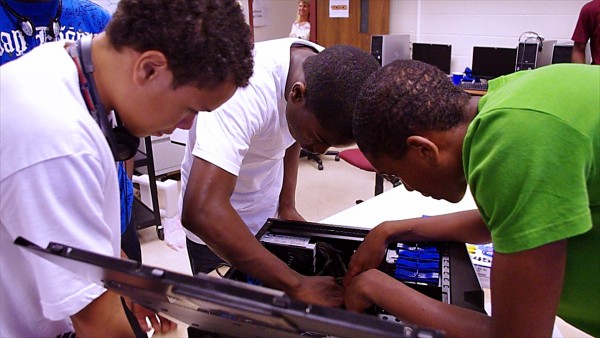Young Black Males, Learning, and Video Games

Betsy DiSalvo is a Human Centered Computing PhD candidate at the Georgia Institute of Technology’s School of Interactive Computing looking at the ways in which culture impacts technology, and how we can leverage cultural practices into designing constructive learning interventions. Her focus is on urban African-American males’ use of video games and why they are not turning their passion for video game play into a larger interest in computer science. In response to this, DiSalvo has created a research project, Glitch Game Testers, a jobs program where African-American teens work for an hourly wage as game testers for commercial game companies.  Now in its third year, the project has shown dramatic increases in the number of participants who are interested in or currently pursuing a college degree in computing or other STEM-related fields. DiSalvo discussed her research with 11 other participants and a handful of mentors this past August at the DML Research Associates Summer Institute 2011. In the video below, she describes how Glitch Game Testers has inspired young African-American men to enter the computer science field. Below are highlights from the video, but the full video (below) is filled with this researcher’s thoughts on race, culture and gaming.
Now in its third year, the project has shown dramatic increases in the number of participants who are interested in or currently pursuing a college degree in computing or other STEM-related fields. DiSalvo discussed her research with 11 other participants and a handful of mentors this past August at the DML Research Associates Summer Institute 2011. In the video below, she describes how Glitch Game Testers has inspired young African-American men to enter the computer science field. Below are highlights from the video, but the full video (below) is filled with this researcher’s thoughts on race, culture and gaming.
Young African-American men and Latino men actually game the most hours per week of any other group, but they are not well represented in computing or other technology-related fields. The common wisdom at the time, which was if you get people gaming like young Caucasian or Asian men then they will go into technology, wasn’t really proving true.
We decided to form a game-testing group after a number of iterations and co-design processes with young African-American men in Atlanta.
There is a lot I’ve found in my research that will apply specifically to how we work with and teach young African-American men and the kind of things that move beyond what I am looking at, which is their motivation to not learn. They are actively choosing to not learn in schools because it’s not cool...the Glitch Game Testers was a way to get them to move beyond that.
Out of the 16 men who graduated from high school, 15 have gone on to college, and of those 15, 13 are in computing-related majors. These are unheard of results for a computer science program to increase participation in computing, especially with this demographic, which is probably one of the more difficult to reach.
Banner image credit: Justin Law
Video credit: Marc Bacarro